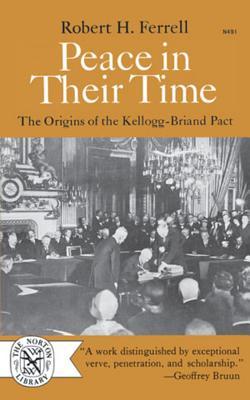After World War I, private peace groups proliferated and rapidly became a significant force in American politics. These groups' activities were regarded by the Harding and Coolidge administrations as a bungling interference with the regular conduct of diplomacy. Ultimately, however, President Coolidge yielded to domestic pressure and the efforts of French foreign minister Aristide Briand to conclude a peace treaty. A protracted series of negotiations between the United States and France resulted in the multilateral Kellogg-Briand Pact, the treaty to "outlaw war."
The Kellogg-Briand Pact, Mr. Ferrell writes, was the peculiar result of some very shrewd diplomacy and some very unsophisticated popular enthusiasm for peace. In analyzing the forces that produced the treaty, Peace in Their Time reveals significant aspects of American foreign policy in the interwar period.
